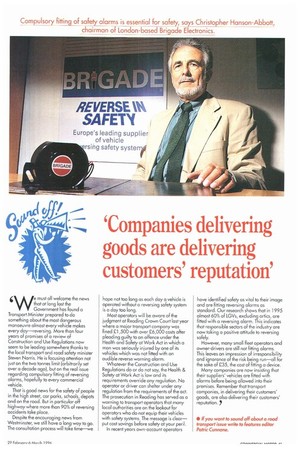'Companies delivering goods are delivering customers' reputation'
Page 43

If you've noticed an error in this article please click here to report it so we can fix it.
6 w
e must all welcome the news that at long last the Government has found a Transport Minister prepared to do something about the most dangerous manoeuvre almost every vehicle makes every day—reversing. More than four years of promises of a review of Construction and Use Regulations now seem to be leading somewhere thanks to the local transport and road safety minister Steven Norris. He is focusing attention not just on the two tonnes limit (arbitrarily set over a decade ago), but on the real issue regarding compulsory fitting of reversing alarms, hopefully to every commercial vehicle.
That is good news for the safety of people in the high street, car parks, schools, depots and on the road. But in particular off highway where more than 90% of reversing accidents take place. Despite the encouraging news from Westminster, we still have a long way to go. The consultation process will take time—we hope not too long as each day a vehicle is operated without a reversing safety system is a day too long. Most operators will be aware of the iudgment at Reading Crown Court last year where a major transport company was fined El ,500 with over £6,000 costs after pleading guilty to an offence under the Health and Safety at Work Act in which a man was seriously injured by one of its vehicles which was not fitted with an audible reverse warning alarm. Whatever the Construction and Use Regulations do or do not say, the Health & Safety at Work Act is law and its requirements override any regulation. No operator or driver can shelter under any regulation from the requirements of the act. The prosecution in Reading has served as a warning to transport operators that many local authorities are on the lookout for operators who do not equip their vehicles with safety systems. The message is clear— put cost savings before safety at your peril. In recent years own-account operators have identified safety as vital to their image and are fitting reversing alarms as standard. Our research shows that in 1995 almost 60% of LGVs, excluding artics, are fitted with a reversing alarm. This indicates that responsible sectors of the industry are now taking a positive attitude to reversing safely. However, many small fleet operators and owner-drivers are still not fitting alarms. This leaves an impression of irresponsibility and ignorance of the risk being run—all for the sake of 235, the cost of fitting a device. Many companies are now insisting that their suppliers' vehicles are fitted with alarms before being allowed into their premises. Remember that transport companies, in delivering their customers' goods, are also delivering their customers' reputation.




































































































